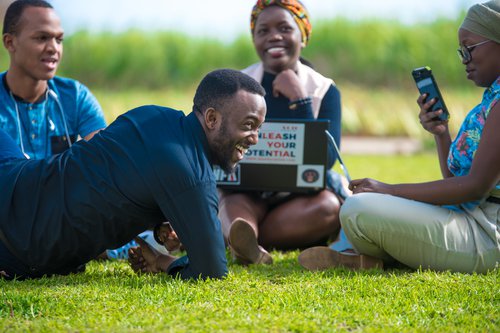Addressing the Whole Entrepreneur

Children need more than just facts and figures to grow into productive, happy adults. They need essential skills like critical thinking, compassion and a reverence for the natural world. It means we need to educate the “whole child,” cultivating the complexity of each individual, nurturing their ideas and imaginations, self-knowledge, social skills and emotional health. It’s accomplished by facilitating experiential learning through questioning and experimentation, by valuing relationships—with others and with your own community, and more.
This is a bedrock of our new philanthropic investment firm, Imaginable Futures (IF), which we are celebrating this week with gatherings from Nairobi to the Bay Area. We believe learning has the power to unleash human potential. It’s not only important for economic mobility and individual well-being, but for developing future changemakers and collective leadership to ensure broader societal flourishing.
What sets us apart is that we carry this whole-child philosophy into how we interact with entrepreneurs. Call it our “whole entrepreneur” philosophy.
What sets us apart is that we carry this whole-child philosophy into how we interact with entrepreneurs. Call it our “whole entrepreneur” philosophy
Amy Klement, Managing Partner, Imaginable Futures
At IF, we invest in bold for-profit and nonprofit changemakers who understand and embrace this imperative. It’s an extension of the Human Capital work we pioneered at Omidyar Network. We invest in for-profits and, typically, make general operating, multi-year grants to nonprofits. And, importantly, we aim to become partners to our entrepreneurs in their journeys, supporting them holistically as leaders.
This approach is different from many venture funds and foundations that provide strategic business support but often miss the “whole entrepreneur.”
Nurturing profits and potential
When we thought about how we could help create an environment and a culture where entrepreneurs are supported, we quickly saw the parallel to the whole child approach. The science of learning shows people need to be in a safe environment to learn. What is an entrepreneur’s journey if not learning? Very few businesses (.00001%) turn out exactly as stated in their start-up business plans. It’s all about learning, listening, questioning, testing and more learning—again and again.
At IF, we know that taking a holistic approach is the best way to unleash the entrepreneur—resulting in more impact and higher returns. So, while we are rigorous on KPIs and financial results, we understand that entrepreneurs are people, too. We have a human-centered investment approach, where focusing on the complete well-being of an entrepreneur enables more impact, more scale and ultimately, more sustainable change.
Being an entrepreneur is all-consuming and stressful. They endeavor to do what has never been done before, creating new products, services and paradigms, expanding into new markets, and serving demanding customers. The bar is even higher for entrepreneurs focused on addressing the challenges of society, with the need not only to hit revenue targets, but also to help people and the planet. Often entrepreneurs act like they are stronger than any stressors and have everything in hand. We recognize it’s impossible to do this all the time. If everything is perfect, entrepreneurs either are not being honest, or they are not pushing the boundaries of what is possible. We don't just care about their business, we care about their health, their families and their lives—because it’s all connected.
We don't have all the answers, but we provide things like executive coaching and approach our work with not just rigorous analysis but also compassion and humanity.
More than just a helping hand
We create the space for entrepreneurs to experiment, share their failures, learn and move forward. Approaching problems as a learning opportunity creates room for more growth and more scale. Because we develop a trusted relationship, we’re able to raise tough issues and communicate. Of course, we’re human and we may not always be successful, but we try.
We create the space for entrepreneurs to experiment, share their failures, learn and move forward. Approaching problems as a learning opportunity creates room for more growth and more scale.
Amy Klement, Managing Partner, Imaginable Futures
Success stories
We find the whole entrepreneur to be a highly effective strategy. We invested in Fred Swaniker’s African Leadership University in its very early stages, when it was still a dream without any campuses, students or accreditations. Now the organization educates students at three campuses in Africa—going beyond just a solid academic foundation to develop the next generation of entrepreneurial, ethical leaders. We have partnered with Fred on issues from fundraising to developing his organizational strategy.
“I don’t think I would be where I am today without the support Imaginable Futures and Omidyar Network have provided beyond the money,” Swaniker said. “When trouble comes, you have people who are aligned and committed to our long-term vision, and we can work together to make it a success.”

Of course, there’s no silver bullet to address all the world’s educational needs. Learning is complex; human beings are complex. That’s why finding and nurturing the best ideas is central to our mission—and we know that good ideas can come from anywhere. Our global platform enables us to identify and partner with some of the world’s leading thinkers and doers at the edge of education innovation.
We are honored to have the opportunity to work with our family of changemakers and welcome more partners to this mission. We’re pausing to mark our launch this week. But, together, we have a lot of work to do to ensure that every learner has the opportunity and the tools they need to imagine, and to realize, a brighter future.